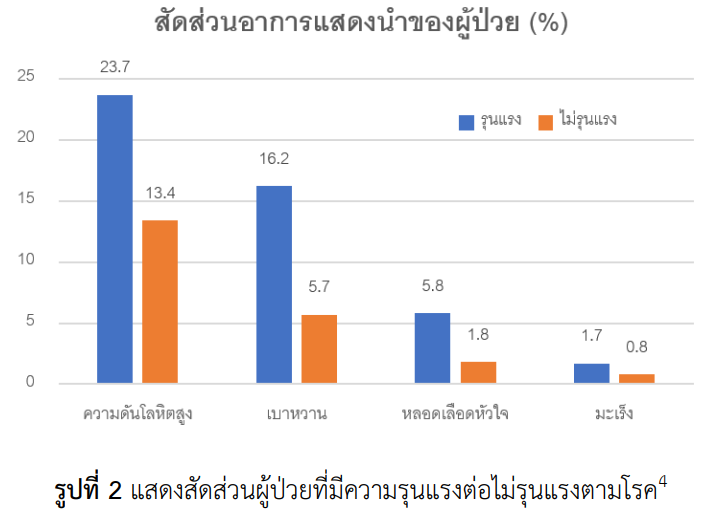How COVID-19 affects cancer and cardiovascular disease
Keywords:
COVID-19, cardiovascular disease, cancer, mechanism of COVID-19Abstract
After Acute Respiratory Syndrome Coronavirus-2 (SARS-CoV-2) was introduced to the world in December 2019, it rapidly continues its journey to more than 185 countries/regions throughout the world in just only a few months1. Due to its powerful transmission capacity, WHO declared COVID-19 a pandemic in March 2020. While the knowledge about risk and its impact is still limited, recent data has shown an association between COVID-19 and the world’s two most common diseases; cardiovascular disease and cancer. Data suggested that these patients are not only more susceptible to SARS-CoV-2 infection, but also likely to develop severe form of disease with higher mortality rate. It is significantly importance to understand the underlying mechanisms of SARS-CoV-2 in order to treat these patients. The purpose of this article is to review current data on the incidence, proposed mechanisms and impacts of COVID-19 among patients with cardiovascular disease and cancer.
Downloads
References
World Health Organization. Coronavirus. WHO Coronavirus disease (COVID-19) outbreak situation. Accessed April 20, 2020. https://www.who.int/emergencies/diseases/novel-coronavirus-2019
Chan J, Ng C, Chan Y, et al. Short term outcome and risk factors for adverse clinical outcomes in adults with severe acute respiratory syndrome (SARS). Thorax. 2003;58(8):686-689. https://doi.org/10.1136/thorax.58.8.686
Badawi A, Ryoo SG. Prevalence of comorbidities in the Middle East respiratory syndrome coronavirus (MERS-CoV): a systematic review and meta-analysis. Int J Infect Dis IJID Off Publ Int Soc Infect Dis. 2016;49:129-133. https://doi.org/10.1016/j.ijid.2016.06.015
Ganatra S, Hammond SP, Nohria A. The Novel Coronavirus Disease (COVID-19) Threat for Patients With Cardiovascular Disease and Cancer. Jacc Cardiooncology. 2020;2(2):350-355. https://doi.org/10.1016/j.jaccao.2020.03.001
Feng R-M, Zong Y-N, Cao S-M, Xu R-H. Current cancer situation in China: good or bad news from the 2018 Global Cancer Statistics? Cancer Commun. 2019;39. https://doi.org/10.1186/s40880-019-0368-6
Richardson S, Hirsch JS, Narasimhan M, et al. Presenting Characteristics, Comorbidities, and Outcomes Among 5700 Patients Hospitalized With COVID-19 in the New York City Area. JAMA. 2020;323(20):2052-2059. https://doi.org/10.1001/jama.2020.6775
Zhang L, Zhu F, Xie L, et al. Clinical characteristics of COVID-19-infected cancer patients: a retrospective case study in three hospitals within Wuhan, China. Ann Oncol. Published online March 26, 2020. https://doi.org/10.1016/j.annonc.2020.03.296
Liang W, Guan W, Chen R, et al. Cancer patients in SARS-CoV-2 infection: a nationwide analysis in China. Lancet Oncol. 2020;21(3):335-337. https://doi.org/10.1016/S1470-2045(20)30096-6
World Health Organization. Report of the WHO-China Joint Mission on Coronavirus Disease 2019 (COVID-19). 16- 24 February 2020. Accessed March 9, 2020. https://www.who.int/docs/default-source/coronaviruse/who-china-joint-mission-on-covid-19-final-report.pdf
Zheng Y-Y, Ma Y-T, Zhang J-Y, Xie X. COVID-19 and the cardiovascular system. Nat Rev Cardiol. 2020;17(5):259-260. https://doi.org/10.1038/s41569-020-0360-5
Zhou F, Yu T, Du R, et al. Clinical course and risk factors for mortality of adult inpatients with COVID-19 in Wuhan, China: a retrospective cohort study. Lancet Lond Engl. 2020;395(10229):1054-1062. https://doi.org/10.1016/S0140-6736(20)30566-3
Bansal M. Cardiovascular disease and COVID-19. Diabetes Metab Syndr Clin Res Rev. 2020;14(3):247-250. https://doi.org/10.1016/j.dsx.2020.03.013
Chen D, Li X, Song Q, Hu C, Su F, Dai J. Hypokalemia and Clinical Implications in Patients with Coronavirus Disease 2019 (COVID-19). medRxiv. Published online February 29, 2020:2020.02.27.20028530. https://doi.org/10.1101/2020.02.27.20028530
Lippi G, Plebani M. Laboratory abnormalities in patients with COVID-2019 infection. Clin Chem Lab Med CCLM. 2020;58(7):1131-1134. https://doi.org/10.1515/cclm-2020-0198
Guo T, Fan Y, Chen M, et al. Cardiovascular Implications of Fatal Outcomes of Patients With Coronavirus Disease 2019 (COVID-19). JAMA Cardiol. Published online March 27, 2020. https://doi.org/10.1001/jamacardio.2020.1017
Wang D, Hu B, Hu C, et al. Clinical Characteristics of 138 Hospitalized Patients With 2019 Novel Coronavirus–Infected Pneumonia in Wuhan, China. JAMA. 2020;323(11):1061-1069. https://doi.org/10.1001/jama.2020.1585
Wu Q, Zhou L, Sun X, et al. Altered Lipid Metabolism in Recovered SARS Patients Twelve Years after Infection. Sci Rep. 2017;7(1):9110. https://doi.org/10.1038/s41598-017-09536-z
American College of Cardiology. ACC Clinical Bulletin Focuses on Cardiac Implications of Coronavirus (COVID-19). American College of Cardiology. Accessed March 20, 2020. https://www.acc.org/latest-in-cardiology/articles/2020/02/13/12/42/acc-clinical-bulletin-focuses-on-cardiac-implications-of-coronavirus-2019-ncov
Kirkpatrick JN, Mitchell C, Taub C, Kort S, Hung J, Swaminathan M. ASE Statement on Protection of Patients and Echocardiography Service Providers During the 2019 Novel Coronavirus Outbreak: Endorsed by the American College of Cardiology. J Am Soc Echocardiogr. 2020;33(6):648-653. https://doi.org/10.1016/j.echo.2020.04.001
American College of Cardiology. HFSA/ACC/AHA Statement Addresses Concerns Re: Using RAAS Antagonists in COVID-19. American College of Cardiology. Accessed March 23, 2020. https://www.acc.org/latest-in-cardiology/articles/2020/03/17/08/59/hfsa-acc-aha-statement-addresses-concerns-re-using-raas-antagonists-in-covid-19
European Society of Cardiology. Position Statement of the ESC Council on Hypertension on ACE-Inhibitors and Angiotensin Receptor Blockers. European Society of Cardiology. Accessed March 27, 2020. https://www.escardio.org/Councils/Council-on-Hypertension-(CHT)/News/position-statement-of-the-esc-council-on-hypertension-on-ace-inhibitors-and-ang

Downloads
Published
How to Cite
Issue
Section
License
Copyright and Disclaimer
Articles published in this journal are the copyright of Chulabhorn Royal Academy.
The opinions expressed in each article are those of the individual authors and do not necessarily reflect the views of Chulabhorn Royal Academy or any other faculty members of the Academy. The authors are fully responsible for all content in their respective articles. In the event of any errors or inaccuracies, the responsibility lies solely with the individual authors.


